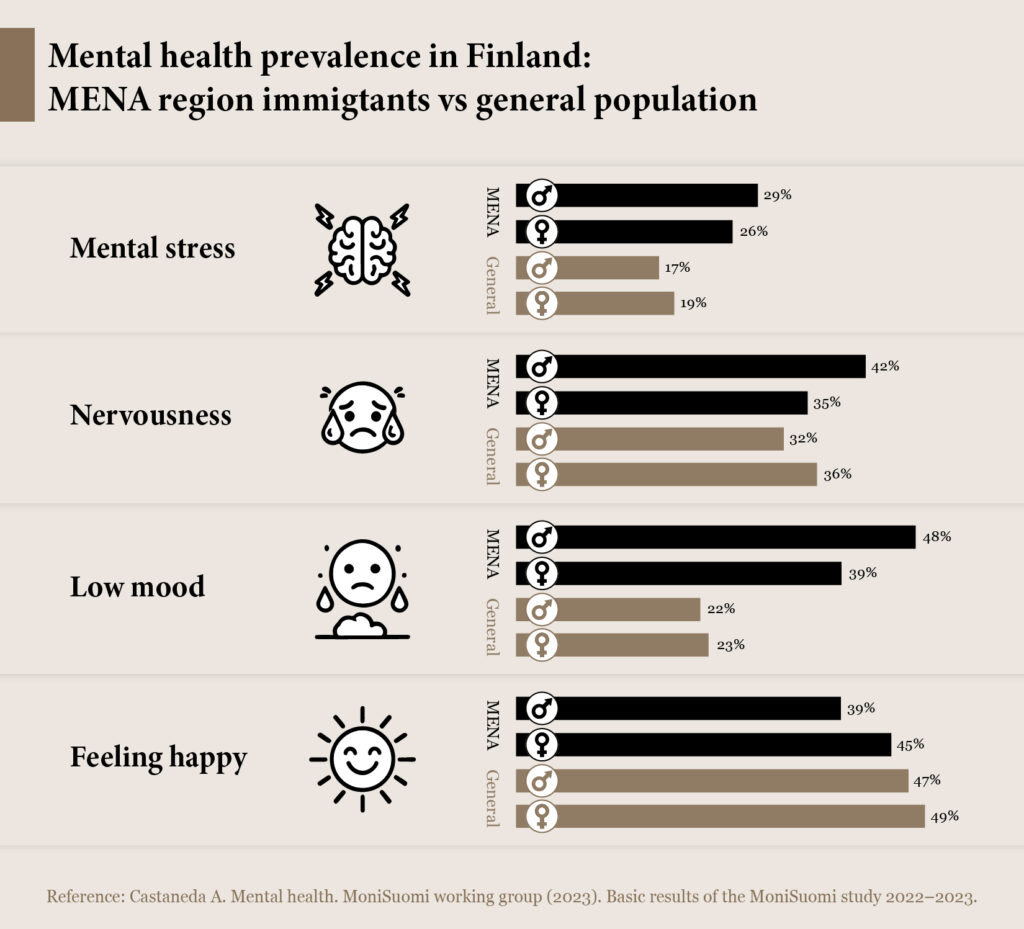Breaking barriers to mental well-being – Arab immigrants often struggle with cultural stigma and systemic gaps

Research shows that immigrants from the Middle East and North Africa living in Finland experience low mood, nervousness, and mental stress more frequently than the general population. ILLUSTRATIVE PHOTO: ADOBE STOCK
Summer Ashraf Abounar
Summer Ashraf Abounar
Published 16.01.2025 at 3:24
Raad Maen, a Jordanian living in Finland for four years, recalls his early days.
“Lack of communication in the workplace was a big challenge,” he says. “Finnish people have a wall of ice, but they’re very friendly once you manage to break it.”
This social barrier, common for many immigrants, worsens the feelings of isolation, especially in a professional environment.
Youssef Ashraf, an Egyptian student who arrived in August 2023, shares a different struggle.
“When I came to Finland, I didn’t know anyone,” he says. “Handling personal papers, adapting to the education system, and dealing with cultural differences were overwhelming.”
Both experiences highlight a larger issue: the mental toll of adjusting to life in a new country while facing limited social support.
Addressing the mental health stigma
Mental health remains a taboo topic in many Arab communities, and this stigma often follows immigrants to Finland.
“As Arabs, we sometimes feel asking for help is a weakness,” Ashraf explains. “There’s pride in enduring struggles alone. It’s a way to prove ourselves to God and ourselves.”
Without the support of close family or friends, seeking help in Finland becomes even harder.
Research confirms these challenges. Anu Castaneda, a researcher at The Finnish Institute for Health and Welfare (THL), highlights systemic and cultural challenges.
“People from the Middle East and North Africa often face mental health problems due to traumatic histories before entering Finland and difficulties like racism, lack of social networks, and limited access to services once here.”
Ashraf notes that while mental health services exist in Finland, they can feel financially and culturally inaccessible.
“Seeking help from a psychiatrist or psychologist didn’t feel like an option either because It would have cost a lot of money – money I needed to sort out my living situation, and it didn’t seem like it would help.”
Although mental health services in Finland are often free or subsidized, many immigrants remain unaware of these benefits. This gap underscores the need for better outreach, such as multilingual campaigns and community workshops, to ensure immigrants know about and feel encouraged to access these resources, promoting well-being and integration.
Language barriers and systemic gaps
Shahd Asad, a Syrian immigrant who has lived in Finland for five years, touches on an issue that many immigrants face: the language barrier in seeking mental health support.
While Finland provides the option to use interpreters during therapy sessions, this solution doesn’t always feel comfortable.
“You don’t feel secure sharing everything about yourself when someone is translating your words to another stranger who speaks a different language,” she explains. This discomfort can make an already vulnerable process even harder.
The Finnish Institute for Health and Welfare notes that factors such as discrimination, loneliness, and financial uncertainty significantly impact the mental health of migrants. Moreover, language barriers and unfamiliarity with the Finnish healthcare system can hinder Arab immigrants from accessing appropriate mental health services.

THL highlights that mental health services are organized differently across countries, and migrants may find it challenging to navigate an unfamiliar system.
“There’s a lack of services designed with minorities in mind,” Castaneda said. “Healthcare providers need more training on diversity, racism, and trauma-informed approaches.”
Finding strength in community and nature
Despite these barriers, many immigrants find ways to adapt and build resilience.
For Maen, the solution was spending time outdoors. “Working out, sports, and outdoor activities helped me a lot,” he says. “Nature is beautiful here, and it always improves your well-being.”
Asad found support in her family and cultural events. “Having a family member with me helped a lot during the long, dark winters,” she tells. Community gatherings also gave her a chance to connect with others and celebrate cultural traditions.
Ashraf found his sense of belonging at university.
“Being around other students who were open to making friends helped me create a sense of community,” he says. Attending events, forming friendships, and engaging with others allowed him to slowly overcome feelings of isolation.
A call for change
Maen and Ashraf encourage fellow immigrants to seek support and stay engaged.
“Don’t be ashamed to speak out,” Maen urges.
Ashraf emphasizes the importance of taking small steps to connect with others. “Getting out of your comfort zone and talking to people can make a big difference.”
Researcher Anu Castaneda believes systemic change is also needed.
“Organizations must diversify their workforce to better represent and support immigrant communities.”